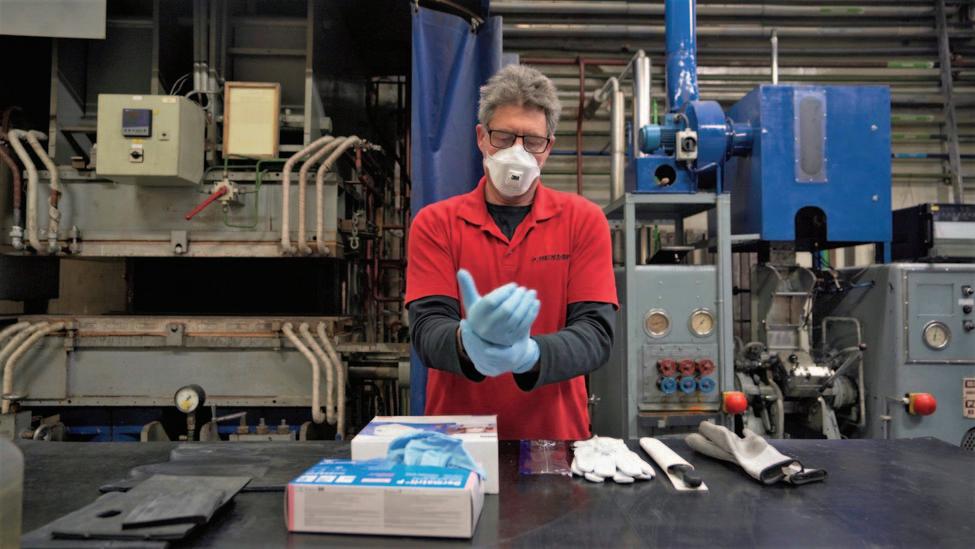
2 minute read
CONVEYING
Advice
substances of very high concern (SVHC’s) which may have carcinogenic classifications (REACH article 57), mutagens and chemicals toxic for reproduction (CMR) as well as Persistent Organic Pollutants (POP’s) and short-chain chlorinated paraffin’s (SCCP’s). Short-chain chlorinated paraffin’s are commonly used, especially in Southeast Asia, to ‘super-accelerate’ the vulcanizing process. Of particular concern is the formation of nitrosamine gases, which are chemical compounds classified as probable human carcinogens based on animal studies, that are known to occur when certain types of vulcanization accelerators are used. The gases can release themselves from rubber belts, which could be hazardous if the belts are stored indoors.
An Open Door
Sadly, some European conveyor belt manufacturers have chosen to ignore
REACH requirements, either completely or at least partially because of the impact on production costs. However, the biggest concern is that manufacturers located outside of EU member states and the UK are not subject to European regulations. Imported belting from Southeast Asia, primarily China, now dominates the European market. Competition is fierce and largely driven by the selling price. Raw materials make up more than 70% of the cost of producing an industrial conveyor belt so the incentive to minimize costs, regardless of risk to human life and the environment is huge. As with all markets, unregulated raw materials cost appreciably less than their much safer, strictly controlled compliant counterparts. This creates an extremely significant selling price advantage for those who are not even subject to safety regulations in the first place.
Although importing belts that contain materials that are controlled or forbidden in Europe is legally permissible, those who import belts from outside of Europe are responsible for regulation compliance. This effectively means that the manufacturers are free from responsibility and the consequences while the importers may be unaware of the risks that they are exposing their business to. Much worse is the fact that those who regularly work with conveyor belts such as conveyor maintenance staff and belt splicers, are exposed to potentially serious health risks, not to mention the untold damage to the environment. Unlike car tyres, less than 10% of conveyor belts are recycled.
Play It Safe
Always ask for written confirmation from the belt manufacturer or supplier that the belt you are buying has been produced in compliance with REACH EC 1907/2006 regulations. A certificate of origin is also helpful.
At the same time, basic safety precautions should be applied. Firstly, wear gloves when handling belts. Secondly, it is advisable to wash your hands before drinking, eating or smoking. Lastly, those involved in activity that may cause rubber dust to be produced, such as grinding for example, should wear a mask to prevent inhalation of dust particles. Bob Nelson
Koch Solutions acquires FLSmidth’s Bulk Material Handling business
Koch Solutions GmbH has acquired the Bulk Material Handling (BMH) Business from FLSmidth A/S, including FLSmidth’s past acquisitions in the BMH area, previously known under ThyssenKrupp Fördertechnik and Sandvik Mining Systems.
Koch Solutions GmbH is a German company whose roots reach back more than 75 years into the past and that has a globally unique set-up with its majority shareholder Rainbow Group having own fabrication facilities with erection and port facilities for fully assembled machines. It combines wellproven German know-how and engineering with excellent Chinese infrastructure.
The acquisition compromises knowhow and IPR such as port/terminal equipment, stockyard systems, pipe conveyors and various continuous surface mining equipment from both legacy FLSmidth and Mining Technologies (ex-TK) portfolios, references, facilities in Australia and Germany, employees and projects by 1 September 2023 for Bulk Material Handling and Mining Technologies.
After the acquisition of FLS Wadgassen by Rainbow Heavy Industries under the flag of Koch Solutions in 2019, this is the next step on Koch Solutions’ ongoing journey –combining excellent and concentrated BMH technology under one roof.
With this acquisition, Koch Solutions has considerably strengthened its position in the bulk material handling market, supplying equipment from mines to ports and stockyards.
With combined services, production and manufacturing, taking into account the new acquisitions, Koch Solutions continuously aims to provide its clients with customized individual all-in-one solutions.

